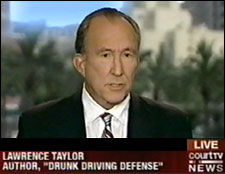Do I have to Take a Breath Test?
Thursday, June 1st, 2017You heard me say a couple of weeks ago that breathalyzers are inaccurate and, as a result, lawyers can challenge the results of a particular breathalyzer. Lawyers, however, cannot challenge breathalyzers generally even though they are inaccurate.
This begs the question: Do you have to take a breathalyzer test?
Like many things in law, the answer is that it depends. In California, there are two different “breathalyzer” tests. One test is required by law, while the other is not.
According to California Vehicle Code section 23612(h), the PAS test “indicates the presence or concentration of alcohol based on a breath sample in order to establish reasonable cause to believe the person was driving [under the influence]…[it] is a field sobriety test and may be used by an officer as a further investigative tool.”
The California Vehicle Code is referring to the roadside breathalyzer, called a preliminary alcohol screening test (PAS test), that officers use to obtain the evidence they need to make a DUI arrest. As an officer makes a stop, whether the officer suspects a DUI or not, they don’t have the evidence needed to arrest the driver on suspicion of a DUI. To obtain that evidence, the officer may ask the driver questions, the officer may have the driver perform field sobriety tests, and the officer may ask the driver to submit to a PAS test. In fact, the PAS test is considered a field sobriety test.
Like the field sobriety tests, the PAS test is optional. Also like the field sobriety tests, a driver should not submit to the PAS test.
In fact, the investigating officer must advise the driver that the PAS test is, in fact, optional. California Vehicle Code section 23612(i) states that “If the officer decides to use a [PAS], the officer shall advise the person that he or she is requesting that person to take a [PAS] test to assist the officer in determining if that person is under the influence. The person’s obligation to submit to a [chemical test under California’s Implied Consent Law] is not satisfied by the person submitting to a [PAS] test. The officer shall advise the person of that fact and of the person’s right to refuse to take the [PAS] test.”
If a driver tells the officer they consumed alcohol or the driver performs and fail the field sobriety tests or the driver provides a PAS sample that shows the presence of alcohol, the driver will likely be arrested on suspicion of a California DUI.
Once the driver is arrested, the California Vehicle Code requires that the driver submit to a “chemical test,” which can either be a breathalyzer test or a blood test. This is called California’s “implied consent law.”
California Vehicle Code section 23612(a)(1)(A) states, “A person who drives a motor vehicle is deemed to have given his or her consent to chemical testing of his or her blood or breath for the purpose of determining the alcohol content of his or her blood, if lawfully arrested for an offense allegedly committed in violation of [California’s DUI laws].”
In other words, if you can legally drive in California, you have impliedly consented to a chemical test if you are lawfully arrested on suspicion of a DUI.
Unlike the PAS test, if you are arrested for a DUI and you do not want to provide a blood sample, the chemical breath test is not optional.
In fact, refusing the chemical test can lead to increased penalties such as a longer DUI school, a longer license suspension, and even jail time.
To sum up, the pre-arrest PAS test is optional and you should always politely decline this test. A post-arrest chemical breath test is required provided the suspect opts not to provide a blood sample.


